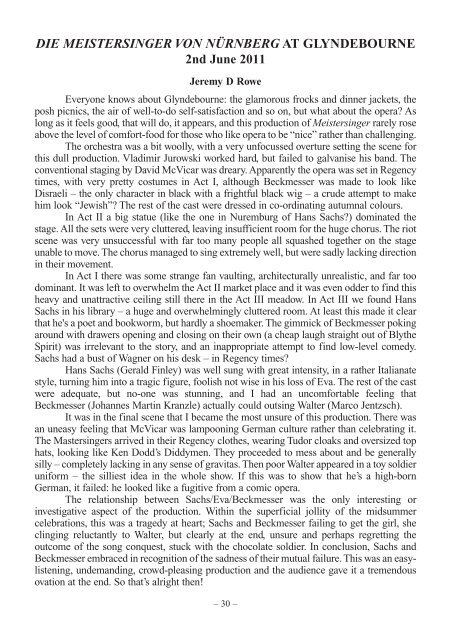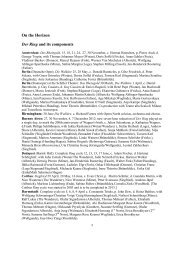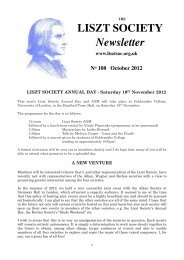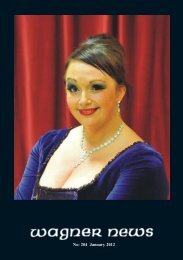Number 202: July 2011 - Wagner Society of England
Number 202: July 2011 - Wagner Society of England
Number 202: July 2011 - Wagner Society of England
You also want an ePaper? Increase the reach of your titles
YUMPU automatically turns print PDFs into web optimized ePapers that Google loves.
DIE MEISTERSINGER VON NÜRNBERG AT GLYNDEBOURNE<br />
2nd June <strong>2011</strong><br />
Jeremy D Rowe<br />
Everyone knows about Glyndebourne: the glamorous frocks and dinner jackets, the<br />
posh picnics, the air <strong>of</strong> well-to-do self-satisfaction and so on, but what about the opera? As<br />
long as it feels good, that will do, it appears, and this production <strong>of</strong> Meistersinger rarely rose<br />
above the level <strong>of</strong> comfort-food for those who like opera to be “nice” rather than challenging.<br />
The orchestra was a bit woolly, with a very unfocussed overture setting the scene for<br />
this dull production. Vladimir Jurowski worked hard, but failed to galvanise his band. The<br />
conventional staging by David McVicar was dreary. Apparently the opera was set in Regency<br />
times, with very pretty costumes in Act I, although Beckmesser was made to look like<br />
Disraeli – the only character in black with a frightful black wig – a crude attempt to make<br />
him look “Jewish”? The rest <strong>of</strong> the cast were dressed in co-ordinating autumnal colours.<br />
In Act II a big statue (like the one in Nuremburg <strong>of</strong> Hans Sachs?) dominated the<br />
stage. All the sets were very cluttered, leaving insufficient room for the huge chorus. The riot<br />
scene was very unsuccessful with far too many people all squashed together on the stage<br />
unable to move. The chorus managed to sing extremely well, but were sadly lacking direction<br />
in their movement.<br />
In Act I there was some strange fan vaulting, architecturally unrealistic, and far too<br />
dominant. It was left to overwhelm the Act II market place and it was even odder to find this<br />
heavy and unattractive ceiling still there in the Act III meadow. In Act III we found Hans<br />
Sachs in his library – a huge and overwhelmingly cluttered room. At least this made it clear<br />
that he's a poet and bookworm, but hardly a shoemaker. The gimmick <strong>of</strong> Beckmesser poking<br />
around with drawers opening and closing on their own (a cheap laugh straight out <strong>of</strong> Blythe<br />
Spirit) was irrelevant to the story, and an inappropriate attempt to find low-level comedy.<br />
Sachs had a bust <strong>of</strong> <strong>Wagner</strong> on his desk – in Regency times?<br />
Hans Sachs (Gerald Finley) was well sung with great intensity, in a rather Italianate<br />
style, turning him into a tragic figure, foolish not wise in his loss <strong>of</strong> Eva. The rest <strong>of</strong> the cast<br />
were adequate, but no-one was stunning, and I had an uncomfortable feeling that<br />
Beckmesser (Johannes Martin Kranzle) actually could outsing Walter (Marco Jentzsch).<br />
It was in the final scene that I became the most unsure <strong>of</strong> this production. There was<br />
an uneasy feeling that McVicar was lampooning German culture rather than celebrating it.<br />
The Mastersingers arrived in their Regency clothes, wearing Tudor cloaks and oversized top<br />
hats, looking like Ken Dodd’s Diddymen. They proceeded to mess about and be generally<br />
silly – completely lacking in any sense <strong>of</strong> gravitas. Then poor Walter appeared in a toy soldier<br />
uniform – the silliest idea in the whole show. If this was to show that he’s a high-born<br />
German, it failed: he looked like a fugitive from a comic opera.<br />
The relationship between Sachs/Eva/Beckmesser was the only interesting or<br />
investigative aspect <strong>of</strong> the production. Within the superficial jollity <strong>of</strong> the midsummer<br />
celebrations, this was a tragedy at heart; Sachs and Beckmesser failing to get the girl, she<br />
clinging reluctantly to Walter, but clearly at the end, unsure and perhaps regretting the<br />
outcome <strong>of</strong> the song conquest, stuck with the chocolate soldier. In conclusion, Sachs and<br />
Beckmesser embraced in recognition <strong>of</strong> the sadness <strong>of</strong> their mutual failure. This was an easylistening,<br />
undemanding, crowd-pleasing production and the audience gave it a tremendous<br />
ovation at the end. So that’s alright then!<br />
– 30 –










